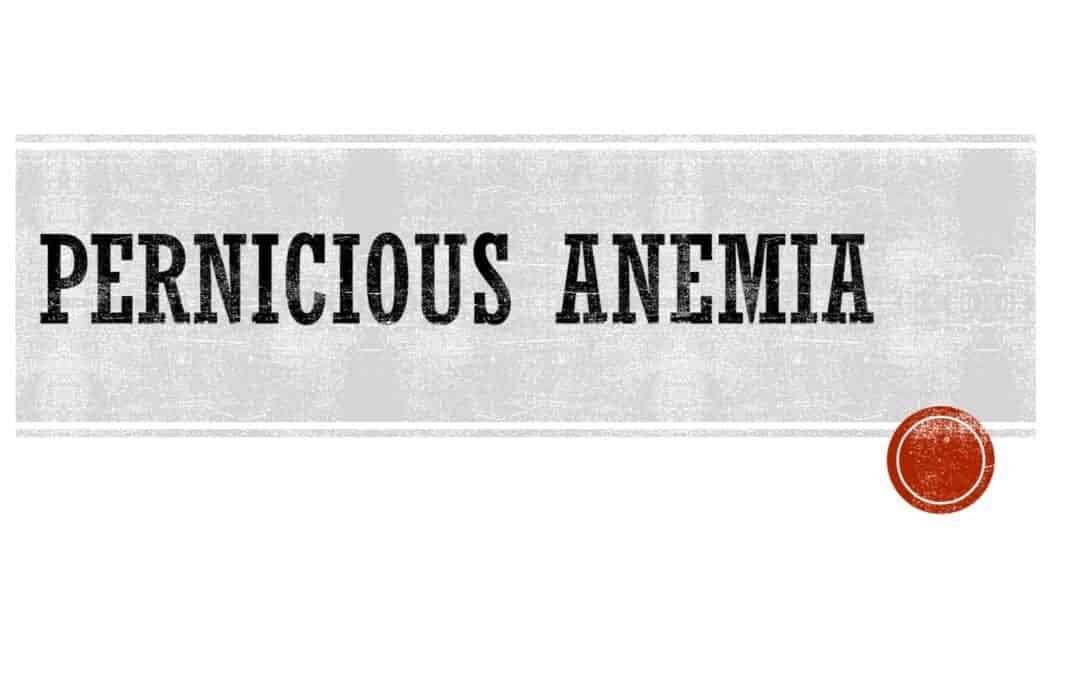INTRODUCTION–
First of all, anaemia is a broad term but in normal understanding it refers to low haemoglobin count in blood which makes blood unable to provide adequate oxygen in body leads to fatigue and various symptoms
Anaemia can be caused by many reasons, so management of each anaemia is different according to its causation. It can be mild to severe (in some cases they are warning sign of serious illness).
Now, Pernicious (term means ‘deadly’) or vitamin B12 (cobalamin) deficiency anaemia is one of the types of anaemia due to lack of vitamin B12 (as human body cannot synthesize vitaminB12 by itself) leading to insufficient production of healthy and mature red blood cells in bone marrow.
We all know vitamin B12 is a water-soluble vitamin which is very important for healthy nervous system, production of healthy red blood cells as well as production of DNA. Daily recommended intake is 2.4mcg for adults which increases in pregnancy as well as during lactation phase. So, if an individual do not fulfil the daily intake due to any causes leads to anaemia.
ETIOLOGY–
PA can happen to any individual in their lifetime but when an individual is having family history of PA then its risk of having PA also increased than those without having such family history, several causative factors are classified as follows-
1) Dietary deficiency- When daily intake of vitamin is not fulfilled from daily diet, as in cases of strict vegetarian or vegan diet (complete restriction of dairy products from diet which are rich source of vita B 12) , it leads to PA in long term.
2)Lack of intrinsic factor (stomach protein )-
This cause is very important to understand as in people who are not vegan or strict vegetarian and also consume enough non-vegetarian food source but still suffers from PA then it is due to deficiency of intrinsic factor in stomach which is necessary for absorption of vitamin B12 from food to body.
3)Different medical conditions-
a) GIT conditions mainly as in ulcerative colitis, Post op stage of Crohn’s disease, few bacterial infections, etc.
b) Diabetes type 1 (autoimmune)
c) HIV patients.
d) Diseases of pancreas.
e) Medical Genetic conditions like- inherited transcobalamin and intrinsic deficiency, etc.
f) Vitiligo
4)Medication and surgery effects-
Some medicines prevent body from absorbing vitamin B12 from food we intake, it mainly includes systemic drugs used in treatment of diabetes, as well as few antacids, etc. Also, surgical interventions in GIT also interferes in absorption.
5)Lifestyle habits-
Healthy lifestyle is very important to prevent any kind of disease or condition, in cases of PA alcoholism act as barrier for absorption in body for vitamin B12, so it should be restricted as per physician guidance in both male and female.
SYMPTOMS–
Here symptoms are broadly classified into general symptoms of anaemia at initial phase followed by symptoms particular to PA in later stages which involves nervous system as well as brain. So, symptoms which are present in PA (along with general anaemia symptoms) are as follows-
1)General symptoms of all types of anaemia are always present, they are-
a) Fatigue (always feeling drained and lethargic even having a full sleep).
b) Shortness of breath, coldness of hand and feet, dizziness as well as headache in some cases.
c) Pale appearance (skin, mucosa, nail beds, tongue, etc.) and red fiery smooth tongue (glossitis is present).
2) Diarrhoea and accompanied weight loss.
3) Derangement of olfactory senses (smell) or taste bud functions.
4) Visual changes are present.
5) Generalized pain and tingling sensations.
6) Locomotor ataxia (lack of coordination in walking) as well as uncontrolled muscle movements as a whole.
7) Loss of balance (cant perform simple day to day activity without getting stumbled upon ).
8) Polyneuritis ( burning sensation in feet and hand, aggravated at night time ).
9) Several mental symptoms are also present, they are-
a) Behavioural changes (eg- irritability, etc.)
b) Mild to severe episodes of depression.
c) Mental confusion, lack of concentration, forgetfulness, sometimes early memory loss can also be seen.
DIAGNOSIS–
To diagnose PA, first of all physician do a routine blood examination to determine the levels of Hb and vitamin B12 in body.
1)For Haemoglobin ranges are-
a) Normal range for Hb (g/dl) – M (13 or higher )/F(12 or higher ).
b) Anaemic-M(12 or lower)/ F(11 or lower ).
2) For vitamin B12 ranges are-
a) Normal range for vitamin B12 (pg/ml) for both male and female- 400 or above.
b) Deficiency- 200 or below.
Along with blood examination, detailed past ,present and family history is taken by physician as even when the tests came negative for vitamin B12 chances of PA remains.
Other neurological tests are done to determine if any nervous changes are present (clinical examination for gait, balance, neuritis, etc. are performed).
For mental changes expert opinions are consulted by physician.
TREATMENT–
Line of treatment is based on the cause and severity of the case. As it can be a life long condition or some acute deficiency conditions, so it mainly depends on the case which leads to different modes of treatment, they are as follows-
1)Oral/nasal/shot method of application- Here shots are prescribed in more serious conditions for rapid recovery.
2)Blood transfusions- In case of severe anaemia along with combination with shots and oral supplement of vitamin B12.
3)Diet recommendations along with medications.
All these together are modus operandi of treatment in PA which improves patients accordingly. Although nervous symptoms takes time to recover but complete reversal of symptoms are not always achieved in every case so early diagnosis and treatment is very important in case of PA.
Complication of untreated PA-
When a case of PA remains untreated then in long run it leads to several systemic complications like frequent infections, bleeding, as well as nervous symptoms become permanent which can not be reversed even after treatment later. In cases of pregnant ladies, it leads to birth defects of brain and spinal cord, also delay in developmental milestones.
PREVENTION–
Golden rule for prevention is to include vitaminB12 rich food items in daily diet. Food items which are rich in vitamin B12 naturally, it includes –
1)Milk, cheese, and other dairy products, as for vegan people fortified milk substitute, etc.
2) Non-veg sources- chicken, egg, lean red meat, fish, sea foods like clams, etc. are very rich sources of vitamin B
3) for those who are vegan or strict vegetarian they are advised to include fortified cereals in daily diet.
When these are included in diet then scope of diet insufficiency of vitamin B12 are very likely to be reduced in turn minimize the chances of acquired deficiency pernicious anaemia in an individual in long run.
NOTE- Acronyms used in this article are-
1)PA- Pernicious anaemia.
2)Hb- Haemoglobin.
3)GIT- Gastro intestinal tract.
4)DNA- Deoxyribonucleic acid.
5)M- Male.
6)F- Female.
Contributor – Dr. Apurva Varangi




